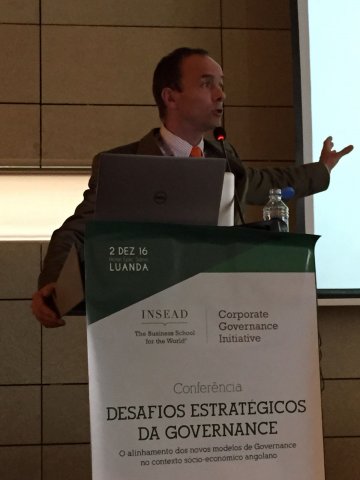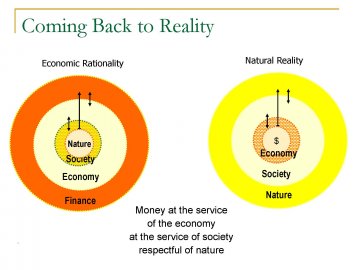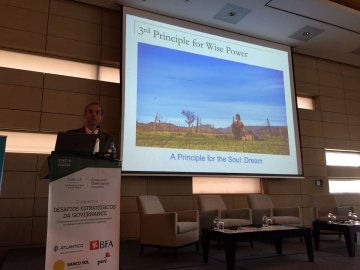December 2nd, 2016 was a historical day for Angola. Not because I was invited to speak at a conference on Corporate Governance in Luanda but because this is the day President dos Santos decided not to present himself to the coming elections. After nearly 40 years with him, Angola is in search of a new Spirit. I looked at it from the bright side.
And this is not necessarily easy. As Angola was to access independence from the Portuguese at the end of one of the most sombre European dictatorship of the 20th century, Angola was also discovered to be the bed of a great amount of oil. Under sea, yes; expansive to extract, yes; but of excellent quality. And as Angola is nowadays the largest oil producer of oil in Africa, it has also been the victim of the fall of oil prices in the last years. To be sincere, it has somehow been the victim of oil since its discovery: the famous Dutch disease or Oil Curse that characterized countries which rely too much on the sole wealth of oil to drive their development. But I said I was looking at the bright side. So the question is: how oil can help to nurture a new bright spirit for Angola? I witnessed the strong belief that it should not be through violence. Everyone wants to forget the bloody civil war and build on the stability which followed by the victory of future ex-President, his army and his party. I sincerely hope that the days ahead will allow the national forces to hold the ground and protect the country. With slightly rising oil prices, and a global momentum to move away from a carbon-based economy, there is a great chance to have the right amount of added value from oil to support a diversification. It was especially interesting to learn at the conference how people there dream of self-sufficiency in basic sectors such as agriculture, textile or raw material for construction. In Angola, globalization may not preclude autonomy.
A second most important question was also very much related to the global dynamics of the time: under which conditions banks can help finance this transition? If the dedication of Angola banks seemed sincere and competent, the question arises from correspondent banks that can ensure the connection of Angola’s economy with the rest of the financial world. In our discussions, the power of the mighty dollar system was very much felt: as the given currency for oil of course (oil represents 95% of exports), but also through the norms pertaining to transactions and governance. Angola is asked (forced?) to adopt the accounting standards of the United States. And it is interesting to note that such exercise of power uses ethics and anti-corruption efforts as a means. Sensitive to this dynamics, and to the emotions felt by a country so proud of its political independences after a long-fought battle, it is not obvious to find a bright way out. There is however no other solution than taking the best of all systems. As Deng Xiaoping said (around the time Dos Santos came into power!), capitalism and communism are two ways to serve the welfare of the people. There is no need to oppose ideologies and there are many smart ways to combine them in order to avoid the worse of each. Angola may fiercely come to terms with practices that now belong to the past and it may do so without selling its soul.
To this end, the obvious bright side of Angola is the proud richness of its people and of its grounds -be it off shore or for agriculture. We dreamed of them leap-frogging to a green and circular economy that uses wisely the new conscience of our unsustainability. Besides the wise men who founded the economic successes of the country over the past 15 years, it was wonderful to meet a new generation of Angola people proud of their roots and farseeing in their visions. The unity provided by Portuguese as a language spoken all over the country is certainly a resource. Moreover, it seems that Portuguese themselves, who were very present at the conference, and expatriates in general, are grateful for the wealth Angola provide to their business or to their home country. In the difficult circumstances of the time, there is an obligation and an opportunity for a win-win post-colonial relation, based on a sense of care for the country itself and for its promises. The question is thus whether these Angola leaders will dare to invent their future on their own terms under the pressure of external conditions, be them coming from other nations or from nature itself.
This is in this context that I deliver my speech on governance as the wise use of power. Treating the global level as well as the corporate and the personal levels, I proposed three principles for the wise use of power.
Firstly, a principle for the mind that I termed duality. As the mind naturally thinks in classes and value-judgement, I invited participants to make the effort to think contrarily to their natural categories and to their prejudices. As Hermann Hesse wrote in Siddharta, “the contrary to any truth can be as true as the truth itself”. It is thus necessary to suspend judgments and apply critical thinking to our natural thoughts, beliefs and methods.
Secondly, a principle for the heart that is certainly called love. The mind can be treacherous to motivate us and there is nothing better than doing what we love to do it sustainably and with courage. Moreover, being able to accept our vulnerabilities helps to have the emotional maturity to thing broadly and creatively.
Thirdly, a principle for the soul that I called dreams. In a time of disruptive uncertainty, dreams can be like a light house in the storm. We do not necessarily head straight towards them, not even reach them exactly, but they offer an irreplaceable sense of guidance for our vision. Dreams help to avoid the many traps that direct routes hide below the surface.
It is with a sense of achievement that INSEAD organizers concluded the conference. There is a genuine opportunity for such events which allow conversations to take place beyond polemics and prejudices. An academic approach combined with a strong sense of relations in the respect of diversity, all with a superb organization, offer a bowl of fresh air in today’s difficulties. In such conferences, the brilliance of INSEAD alumni prove that INSEAD is a business school for the world and it was indeed my privilege to be part of it. I wish Angola, its people and its Alumni to find a bright new spirit for the days ahead.


